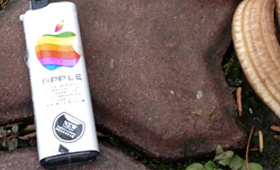-
Apple Struggles to Be More Than China's Porsche of Phones
蘋果公司將致力於成為手機界的保時捷Posted by Abe Sauer on December 18, 2012 01:40 PM指導者 / 總編輯 張蕙娟摘譯者 / 賴俞臻前一陣子才在中國市場推出的iphone5相比於iphone4S的銷售量更為龐大,上市一周內已賣出200萬台,同時透過和電信業者及通路廠商的配合,將用戶扣除方案費用後實際支付價格壓低在$100美金以下的方式增加銷售量。然而,在日前的調查中,蘋果公司的手機在大陸市場的市占率由第四名下滑至第六名,而當地品牌如聯想以及華為則是以平價且多功能的手機佔有市場60%的份額。因此,蘋果公司致力於將品牌打造成如同保時捷般象徵流行的指標,同時也在二線都市中的成都增開了直營店,希望能夠將品牌形象深根於大陸市場。
China's streets are, sometimes literally, littered with the Apple logo. But as much an IP violation as unlicensed merchandise is, its existence has always said something about the power of Apple's brand in China. Indeed, it was only in January that the country's launch of the iPhone 4S forced the brand to halt sales after fears of uncontrollable crowds.
Apple's iPhone 5 China launch produced no mass hysteria and the barricades erected outside one Beijing store were unceremoniously taken down soon after launch. Yet the brand sold a tidy 2 million units of its latest iPhone over the weekend. How? By selling the iPhone 5 for under $100.
For the first time, Apple service partners in Shanghai opened at midnight on Dec. 14 to begin selling iPhones. Official Apple stores followed at 7:00 am with a new reservation system in place aimed at stopping overcrowding and scalpers.
Apple did set an iPhone sales record over the weekend but that was accomplished in part through heavy discounting through its service provider partners, China Telecom and China Unicom. Hundreds of thousands of iPhone 5 reservations were made with carrier China Unicom before Dec. 14. But while Unicom iPhone 5 buyers will pony up 5,899 RMB (about $940) for the 16GB unit, that amount will go toward service over the contract period. The result of the discounting is that the iPhone 5 itself could end up costing users as little as $100
While some called the two million in three days number "robust," Apple shares slid after a stock downgrade that has, in some part, to do with Apple's failure to get compatible with the TD-SCDMA 3G network of China's most popular service provider, China Mobile.
In a statement, CEO Tim Cook called the China iPhone 5 launch Apple's "best first weekend sales ever in China." He added, "China is a very important market for us and customers there cannot wait to get their hands on Apple products.”
The last part of Cook's statement may not be as true as the rest, even though, because of the reservation system, literally more than 300,000 were waiting to get their iPhone 5 before the Dec. 14 release. (A fact, meanwhile, that throws a little cold water on the otherwise impressive "two million in three days" claim.)
Overall, fewer customers are waiting to get their hands on Apple products. In the period ending in September, Apple's market share in China slid from fourth to sixth. Samsung rules the roost with most market share. But a worrying trend for Apple should be that 60 percent of the market is now owned by domestic brands like Lenovo and Huawei. These manufacturers are offering very inexpensive, feature-rich products.
Meanwhile, China's slow service network hobbles Apple's best user qualities, turning its products into status symbol bricks. This phenomenon also extends to the Apple Mini, which the Shanghai Daily paid the underhanded compliment of calling it "a hit with Shanghai women."
One sign that Apple's brand strength is at least fighting to maintain its current level was the group camped outside the Chengdu Apple Store, which opened Dec. 15, the day after the iPhone 5 launch.
Just two months after opening its largest ever store in Asia in Beijing, Apple's swung open the doors in Chengdu, Sichuan Province, the brand's first glass chapel in west China. For the record, Apple now has 11 stores in China with three in Beijing (north), three in Shanghai (east coast), three in Hong Kong and one on Shenzhen (south) and, now, one in Chengdu (west). Chengdu is China's fourth largest city with about 14.5 million residents. It has also successfully branded itself internationally as the: http://v.youku.com/v_show/id_XNDg4NjU1MjE2.html
Apple's entry into Chengdu is meaningful because of the municipality's status as a "second tier" city. (China's cities are informally stratified into first, second, and third "tiers" of development). Until Chengdu, Apple's stores were located only in the first tier cities of Shenzhen, Shanghai and Beijing. In an in-depth look at the store (and its historic t-shirt), MIC Gadget reported that Apple will open another Chengdu store soon.
Any brand that hopes to have a large-scale future in China must reach at least the second (and ideally third) tier consumers. From Starbucks to Samsung to Suzuki to real estate, this is where all of the marketing action is now focused in China. With China's recent stimulus improving infrastructure and living conditions in the roughly 150 second tier cities combined with the saturated markets in tier one cities, retailers and brands are rushing to get tier two footholds. Apple, which had predicted 25 China stores by now, is, in fact, well behind the game.
Apple remains a popular, sleek brand in China. But it is struggling to expand its popularity because its cannot currently offer its users any concrete advantages beyond that strong brand image. Siri never caught on. Apple's success is coming solely from its brand momentum. So for the time being, Apple's iPhone will need to be content as the Porsche of China.
Porsches, from Cayennes to Boxters, are a common sight on China's roads. But the brand is a popular status symbol, driven on often-clogged streets where performance is a humorous punchline. Watch Bloomberg reporter Stephen Engle race a Porsche Panamera GTS against a bicycle across Beijing. The results should not surprise anyone familiar with Beijing.
But then, Porsche drivers stuck in traffic can pull out their iPhone 5s and wait for Youku.com to load in style.
摘譯自BrandChannel:
http://www.brandchannel.com/home/post/2012/12/18/China-iPhone-5-Launch-Lessons-121812.aspx#continue





